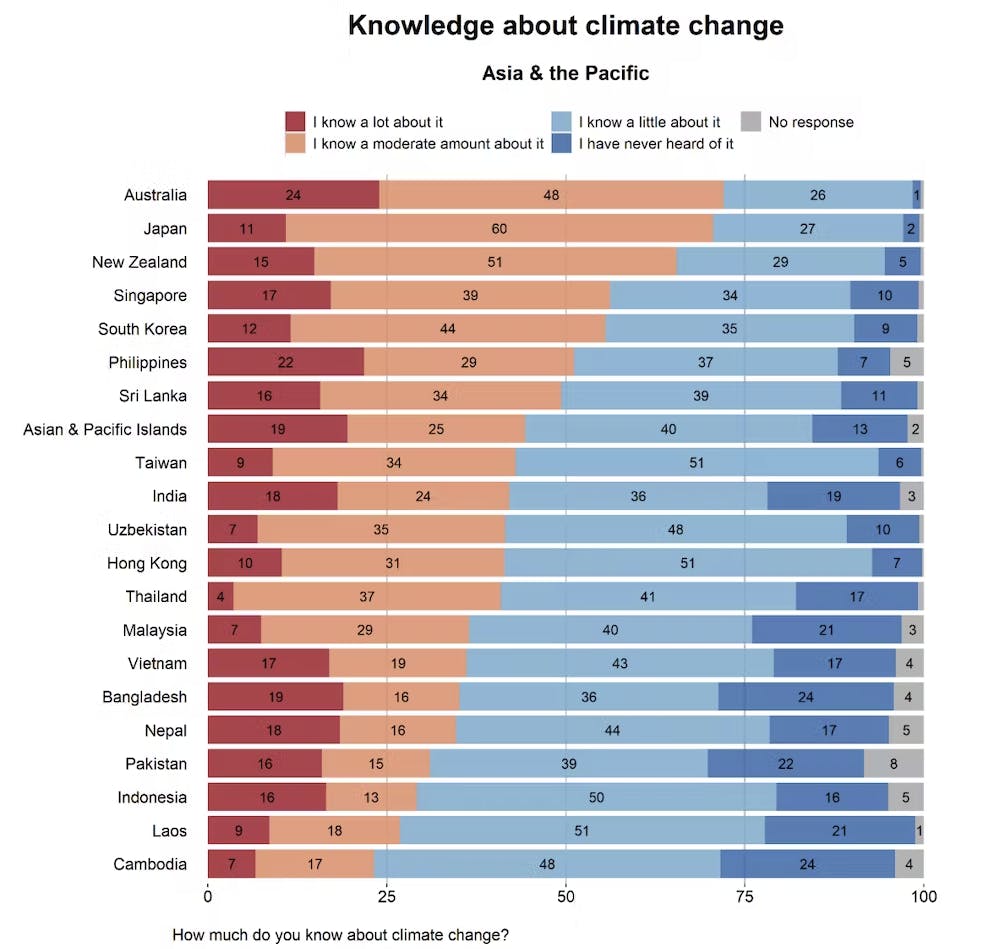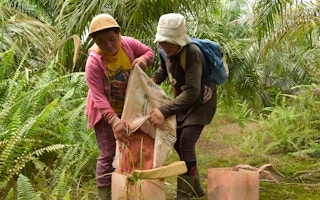Despite the country’s good progress in addressing climate change, two recent surveys have shown many Indonesians do not understand climate change or its causes.
A 2021 survey, published last month, asked a random sample of 3,490 Indonesians from 34 provinces if they had ever heard the term “climate change”, followed up with focus group research last year.
The survey found 88 per cent of respondents, aged 16 to 60 years, had heard of the term – but only 44 per cent of them could define it correctly.
The research, by environmental non-profit organisation Dialogue Development Asia communication consultant Communications for Change, also found only one in three of those surveyed believed global warming is happening, while less than half (47 per cent) believed it had been caused primarily by humans.
These findings were echoed in an even bigger 2022 Yale climate change survey, involving 108,946 adult Facebook users in 192 countries and territories – including 1,178 Indonesians.
That survey found Indonesians were the least likely (18 per cent) of any nationality to say climate change is “caused mostly by human activities”, along with people from Yemen (21 per cent).
Among Asian and Pacific nations, only Laos and Cambodia had lower self-reported rates of knowledge about climate change than Indonesia. Two-thirds of the Indonesian survey respondents said they knew either “a little” or “had never heard of” climate change, compared to just 29 per cent who said they knew either “a lot” or had “moderate” knowledge about it.

Indonesian Facebook users had one of the highest rates in Asia and the Pacific of responding they knew only ‘a little’ or ‘had never heard of’ climate change. International Public Opinion on Climate Change, 2022, Yale Program on Climate Change Communication and Data for Good at Meta. Image via The Conversation.
Educating people about climate change in a country where many still consider the topic personally irrelevant is a huge challenge.
When people have a better understanding of climate change, they can demand that policymakers take more ambitious steps to address it and hold them accountable for any inaction.
Thus, as a researcher in climate policy, we should involve more people in the conversation.
Here are three steps we can take to raise the public’s awareness and make climate change an important issue for everyone in Indonesia.
1. Understand people’s worldviews
First, we need to understand our target audience, including their worldview.
A worldview is a person’s unique perspective, based on their beliefs, values, culture and experiences.
An unusually high proportion of Indonesians – 93 to 97 per cent – hold a conservative worldview. They value preserving institutions associated with greater authority, such as religious and state institutions. They also include moral traditions, spiritual codes and local customs.
Although many Indonesians are still not familiar with the concept of climate change, about 80 per cent of them believe that humans have a moral responsibility to protect the environment.
This responsibility reflects their values in defending nature as part of their obedience to authority and a sense of patriotism – all tied to a conservative worldview.
Due to Indonesians’ conservative views, it’s crucial to tailor the narrative on climate action to fit these views.
A report suggests liberal-leaning messages resonate less with the Indonesian public than conservative-leaning ones. Such findings mean words like “losing the forest will put Indonesia’s sovereignty in jeopardy” or “preserving the forest is our duty as people of faith” are more effective than messages like “protect the forest, save Indigenous communities.”
Governments and civil society organisations need to identify their target audience and understand their perspectives to educate them effectively on climate change.
2. Connect with people’s real lives
Raising awareness about climate change among the Indonesian public is crucial. However, it’s equally important to simplify the message, considering that the concept of climate change can be complicated and highly technical.
To do this, the narrative on climate change should resonate with people’s everyday lives. For instance, the term selimut polusi (pollution blanket) in Indonesian is effective in describing climate change to the public.
To raise public awareness about the climate emergency in Indonesia, governments, civil society organisations and universities should work with public relations or communication strategists to tailor compelling narratives on climate change.
3. Use social media
Individual actions can pressure decision-makers for public causes.
Climate change is no exception. Raising the awareness of the Indonesian public on climate, if done right, can increase Indonesia’s commitment to climate actions and preserving the environment.
Social media is a great way to do this, as long as the right people and groups can access the correct information, such as facts about climate change, and create stories that matter.
The government or other groups can use social media to help people understand climate change better. Many Indonesians use social media: there were about 191.4 million active social media users in Indonesia in 2022. That’s the third most in the Asia Pacific region, behind only China and India.
Governments or civil society organisations, equipped with the correct narratives and strategies, could use social media to raise public awareness of climate change.
In conclusion, we need to help more Indonesians understand climate change if we want our leaders to take action.
It’s not just about changing policies, but also making sure more people know about climate change. We can help by using the proper communication approaches to talk to people about the issue.
Brurce Muhammad Mecca is senior analyst at Australia-based non-profit Climateworks Centre.
This article was first published at The Conversation.

















